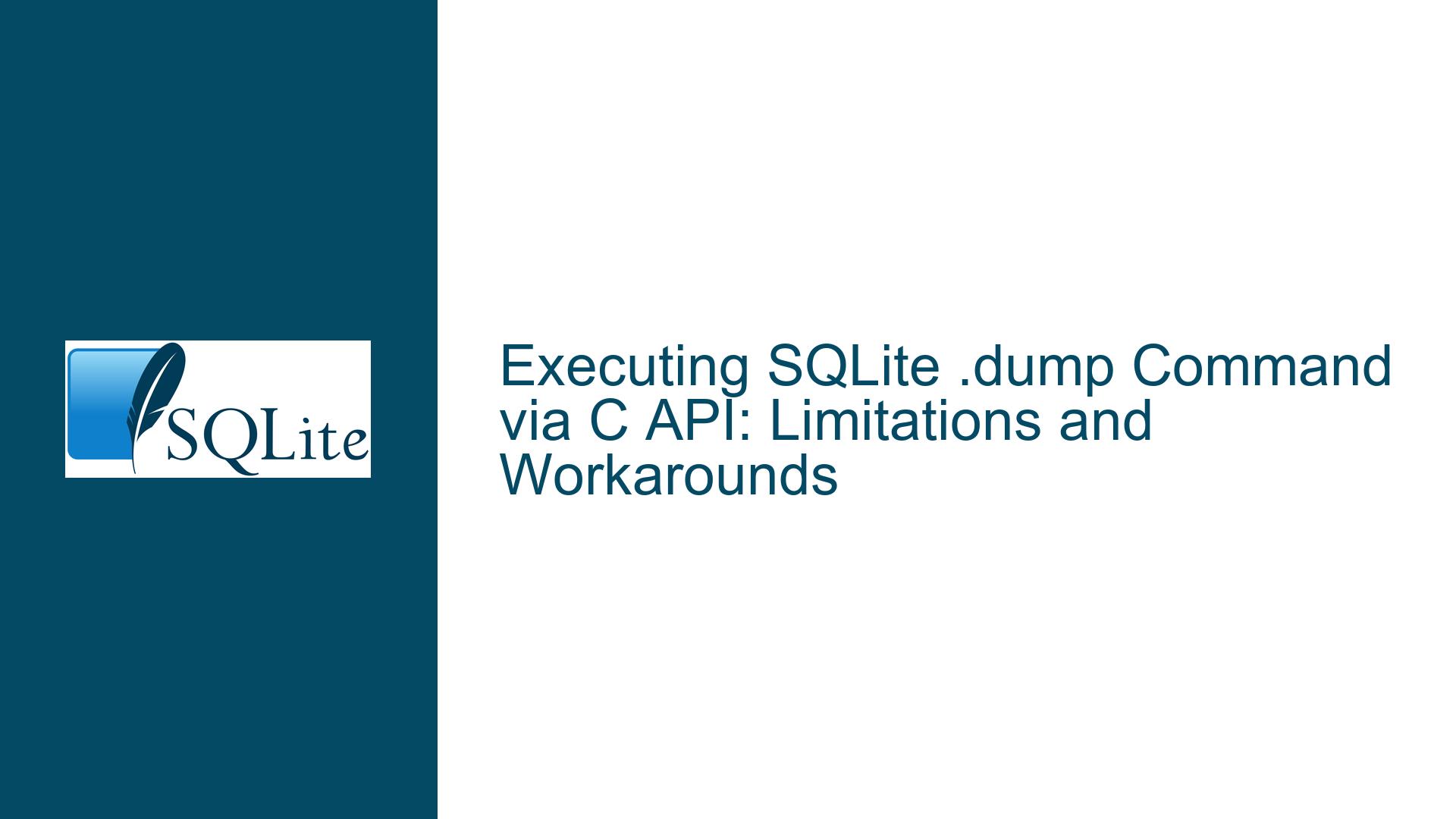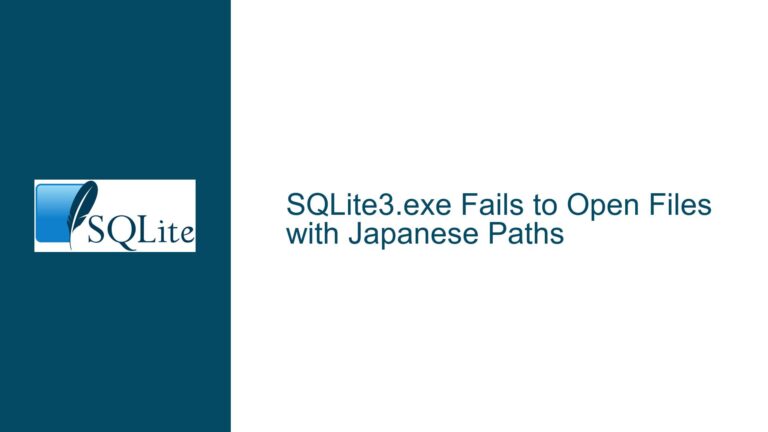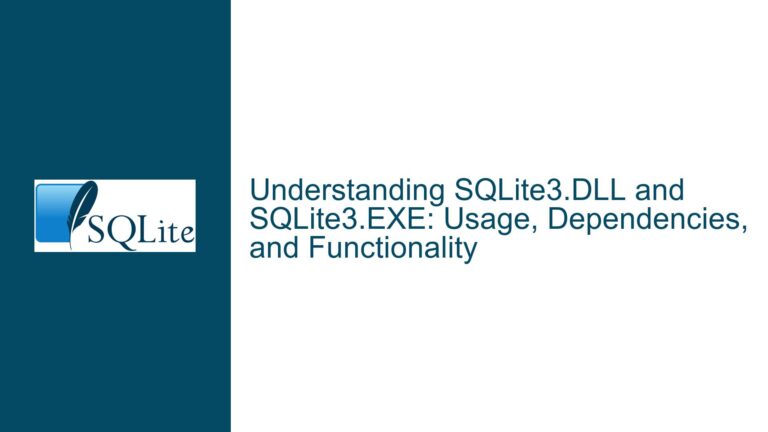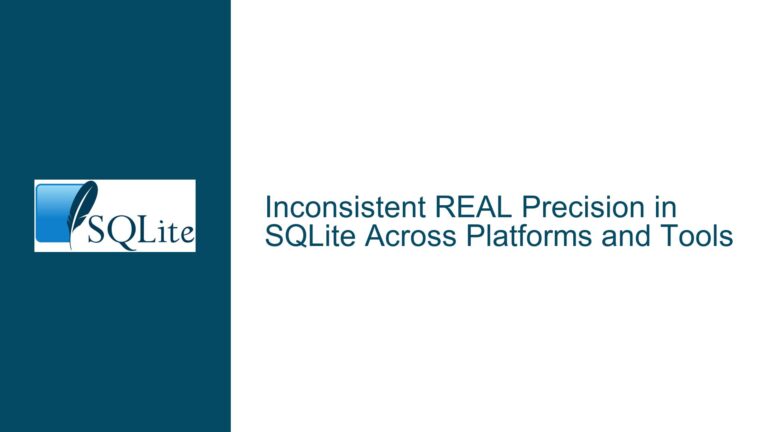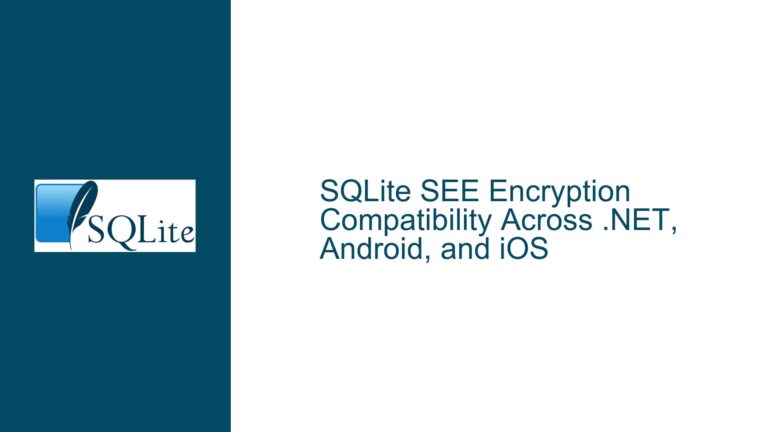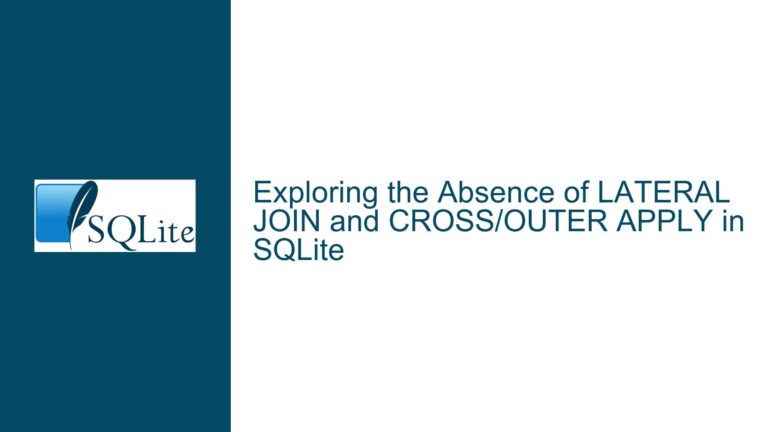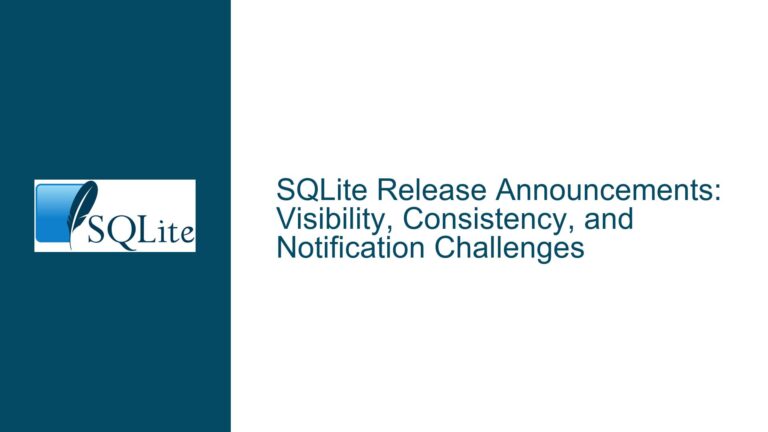Executing SQLite .dump Command via C API: Limitations and Workarounds
Understanding the Core Challenge: Invoking CLI-Specific Functionality via C API
The central issue revolves around programmatically executing SQLite’s .dump command – a feature native to the SQLite command-line interface (CLI) – through the C API. The .dump command generates SQL text that reconstructs a database or specific tables, including schema definitions and data insertion statements. Developers often seek to replicate this functionality within applications using SQLite’s C API for tasks such as database backups, migrations, or debugging. However, the C API does not directly expose CLI-specific commands like .dump, leading to confusion about how to bridge this gap.
The .dump command is implemented within the SQLite CLI’s codebase (shell.c), not the core SQLite library (sqlite3.c). This separation means that CLI utilities are distinct from the database engine itself. The C API provides low-level access to database operations but lacks built-in support for CLI commands. Consequently, developers must choose between re-implementing the logic behind .dump, extracting and adapting code from the CLI, or leveraging alternative methods to achieve equivalent results. This challenge is compounded by nuances in SQLite’s architecture, licensing, and error-handling paradigms.
Architectural Constraints and Licensing Considerations
The inability to execute .dump directly via the C API stems from SQLite’s design philosophy, which decouples the database engine from auxiliary tools like the CLI. The CLI serves as a frontend application that utilizes the C API to interact with databases. Its features, including dot commands, are not part of the core library. Attempting to invoke CLI-specific functionality from the C API is akin to expecting a car engine to include a dashboard navigation system – they are separate components.
A critical architectural constraint is the absence of a formal interface between the CLI and the C API for dot commands. The .dump command relies on CLI-specific code that iterates over database schemas, queries table metadata, and constructs SQL statements. This code resides in shell.c, which is not linked into applications using sqlite3.c unless explicitly included. Even then, the CLI’s code assumes an interactive environment with terminal I/O, error-handling mechanisms (such as process termination on out-of-memory errors), and other context-dependent behaviors that are unsuitable for embedded use.
Licensing permits copying and modifying SQLite’s source code, including shell.c, as it is in the public domain. However, integrating CLI code into an application introduces dependencies on non-core components. For instance, the .dump implementation depends on global variables, static functions, and helper routines designed for the CLI’s workflow. Adapting this code requires careful isolation of relevant logic while avoiding unintended side effects, such as abrupt process exits on errors.
Another layer of complexity arises from SQLite’s error-handling strategy in the CLI. The shell terminates the process on critical errors (e.g., memory allocation failures), a behavior incompatible with library-like usage. Modifying this to return errors gracefully via the C API necessitates significant code changes. Furthermore, the CLI’s use of C preprocessor macros and platform-specific code (e.g., for command history or line editing) adds portability challenges when repurposing its code.
Strategies for Implementing .dump Functionality via the C API
Extracting and Adapting Code from SQLite’s Shell.c
The most direct approach involves extracting the .dump command’s implementation from shell.c and integrating it into a custom application. This requires identifying the relevant code paths and isolating them from CLI-specific dependencies. In shell.c, the .dump command is handled by the do_meta_command function, which dispatches commands based on user input. The specific logic for .dump resides in the dump_callback function and its associated SQL queries.
To adapt this code:
- Locate the Dump Logic: Search for the string
"dump"in shell.c to find the command handler. Thedo_meta_commandfunction checks for the.dumpprefix and invokesdump_callbackafter setting up a database connection. - Isolate Dependencies: The
dump_callbackfunction relies on global variables likestdoutfor output and CLI-specific helper functions (e.g.,output_redirectionfor file I/O). Replace these with application-specific I/O routines that capture output in memory or write to a user-defined stream. - Handle Errors Gracefully: Modify the CLI’s error-handling code to return error codes instead of calling
exit(). For example, replacefatal_errorcalls withsqlite3_errmsgand propagate errors back to the caller. - Link Shell.c Components: Include necessary portions of shell.c in the project, ensuring that required data structures and static functions are made accessible. This may involve removing
staticqualifiers from functions likedump_callbackor refactoring them into a separate module.
Example code snippet for invoking the adapted dump logic:
// Custom function wrapping the adapted .dump code
int custom_dump_table(sqlite3 *db, const char *table_name, FILE *output) {
// Replace stdout with the provided output stream
FILE *original_stdout = stdout;
stdout = output;
// Invoke the modified dump_callback for the specified table
int rc = dump_callback(db, table_name);
// Restore stdout
stdout = original_stdout;
return rc;
}
Reimplementing .dump Using the C API
An alternative to borrowing CLI code is to reimplement the .dump command’s logic using standard C API functions. This approach avoids dependencies on shell.c but requires replicating the steps performed by the CLI:
- Query Schema Information: Use
sqlite3_execor prepared statements to retrieve schema details from thesqlite_mastertable. Filter results for the target table to generateCREATEstatements. - Export Data as INSERT Statements: Iterate over the table’s rows using
SELECT * FROM [table]and constructINSERTstatements. Usesqlite3_column_*functions to extract data and properly escape strings. - Handle Indexes and Triggers: Include associated database objects by querying
sqlite_masterfor indexes and triggers linked to the table. - Transaction Management: Wrap the dump in a transaction to ensure consistency by emitting
BEGIN TRANSACTION;andCOMMIT;statements.
Example workflow:
void dump_table(sqlite3 *db, const char *table_name) {
// Retrieve CREATE TABLE statement
sqlite3_exec(db,
"SELECT sql FROM sqlite_master WHERE type='table' AND name=?;",
dump_create_callback, NULL, NULL);
// Generate INSERT statements for each row
char select_sql[256];
snprintf(select_sql, sizeof(select_sql), "SELECT * FROM \"%w\";", table_name);
sqlite3_exec(db, select_sql, dump_insert_callback, NULL, NULL);
}
int dump_create_callback(void *data, int argc, char **argv, char **col_name) {
printf("%s;\n", argv[0]); // Output CREATE TABLE statement
return 0;
}
int dump_insert_callback(void *data, int argc, char **argv, char **col_name) {
// Construct INSERT statement from row data
// (Simplified; actual implementation requires proper escaping)
printf("INSERT INTO ...;\n");
return 0;
}
Leveraging the Upcoming Extensible Shell Library
A long-term solution involves utilizing SQLite’s extensible shell library, currently under development. This project aims to modularize the CLI’s functionality, making it embeddable as a library. Once completed, developers will be able to invoke CLI commands programmatically via a clean API, including .dump.
Key features of the extensible shell library:
- Function-Based Invocation: CLI commands will be callable via functions like
sqlite3_shell_exec(), eliminating the need to parse command strings manually. - Improved Error Handling: The library will return errors through the C API instead of terminating the process, making it suitable for integration into larger applications.
- Extension Support: Users will be able to add custom commands or override existing ones, enhancing flexibility.
While this library is not yet available, developers can monitor SQLite’s official channels for updates. In the interim, the aforementioned workarounds remain necessary.
Conclusion
Executing the .dump command via SQLite’s C API requires circumventing architectural limitations through code adaptation, reimplementation, or anticipation of future library features. Each approach involves trade-offs: extracting CLI code offers immediacy but introduces maintenance overhead; reimplementing logic ensures independence but demands rigorous testing; awaiting the extensible shell library promises elegance but delays implementation. By understanding these options and their implications, developers can choose the strategy best aligned with their project’s requirements and constraints.
